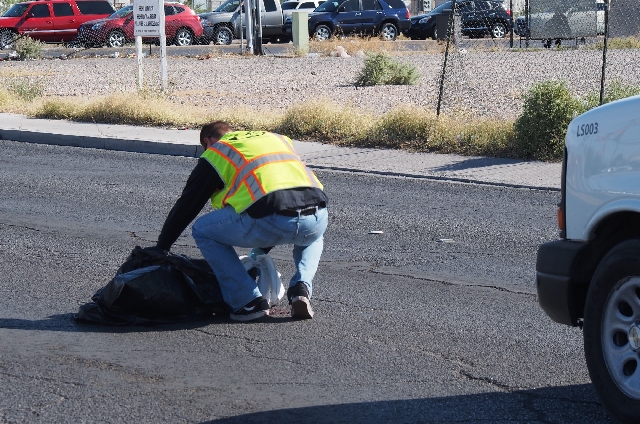When animals die on Clark County roads, crew gently takes them away
Sometimes, the victim is an anonymous creature that quietly perishes along the highway, missed by none.
Other times, a fretting pet owner hears the news about the death after a positive identification is made through a microchip, getting a degree of closure.
Either way, Clark County has a contractor that takes care of roadkill, regardless of the animal or its circumstances, to keep the roads safe for motorists. Logistical Solutions is paid $9,300 a month to pick up the animals within an hour of being notified by the county’s Department of Public Works.
The job has more to it than simply removing dead animals from roads. It requires electronic gadgetry, a bit of occasional detective work in tracking down animal owners and enough sensitivity to gauge if a pet’s grieving owner should see the remains.
The county hired Logistical Solutions in February for the job. The Las Vegas company does a variety of waste management and cleanup services, including hazardous materials, crime scenes and methamphetamine labs. As a result, it’s used to dealing with sensitive situations, said Ty Salazar, the company’s operations director.
“It really just fits our mold for what we do,” he said.
Logistical Solutions has three on-call employees who can respond to calls for removing dead animals. Upon arrival, they have multiple tasks: flick on warning lights on the vehicle and pick up the animal with gloves, putting it in a sealed bag and a biohazard tub.
They also clean any remains on the street with disinfectant, including blood. By removing all traces, there’s no risk of a passer-by seeing blood and thinking it’s a crime scene.
For domestic pets such as dogs and cats, they use a handheld scanner to check for microchips, which have information for tracing pet owners.
“We don’t treat this like a bag of trash,” he said.
For animals with microchips, the company notifies owners. Sometimes, the owners come pick them up. For others, getting the notification is enough closure.
At the same time, the company also uses good judgment — keeping in mind the condition of the remains and advising pet owners whether or not it’s best to view them.
“It doesn’t stop once the animal is picked up,” Salazar said.
The animals initially are gently placed in black sealed bags inside a refrigerator on the company grounds while efforts start to contact the pet owner. If they are not picked up, the animals are taken to an animal shelter, which cremates the remains.
Besides the microchips, the company keeps an eye on missing pet notices and photographs the animals for its records to help make future owner identifications possible even after disposal.
Clark County’s annual roadkill count for the past five years varies from a low of 754 in 2010 to a high of 883 in 2009. In 2012, 882 animals died on county roads, according to Dan Kulin, Clark County spokesman.
Most of the work is with cats and dogs, but other cases arise that are off the beaten track. On one call, five roosters in a bag were found. On another, it was a coyote or fox — they aren’t sure which it was.
The Nevada Department of Transportation has a different approach for state-maintained highways. Its workers take care of roadkill removal along with other tasks, including debris removal and putting up signs and striping roads.
As a result, it’s harder to gauge the level of roadkill on interstates and state highways.
“It’s hard to quantify,” said Mohamed Rouas, assistant district engineer in charge of maintenance for the agency’s Southern Nevada district. “We don’t have a separate item for looking up roadkill.”
If it’s a domestic animal, they take it to a shelter that will work to identify the creature and look for an animal. Wild animals, like burros and deer, are buried at Transportation Department sites stocked with road construction supplies.
If roadkill is in a traffic lane, the response will be quicker. If it’s elsewhere, the wait might be longer, Rouas said.
“If it’s not a safety issue; we leave it there for a few hours,” he said.
Like the county roads, there are no stretches of highway that are famous for roadkill.
“It just depends,” Rouas said. “There is no specific area that’s a hot spot.”
Contact reporter Ben Botkin at
bbotkin@reviewjournal.com or 702-455-4519.
HOW TO REPORT ROADKILL
—In Clark County’s jurisdiction, call the Department of Public Works, 702-455-6000.
—Along state highways, contact the Nevada Department of Transportation’s regional transportation office, 702-385-6500.


















